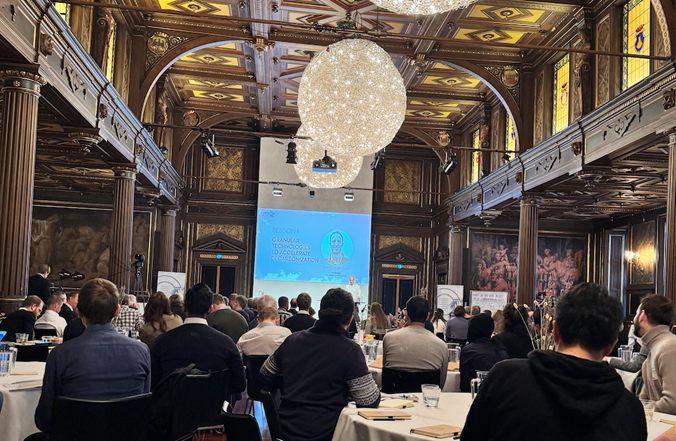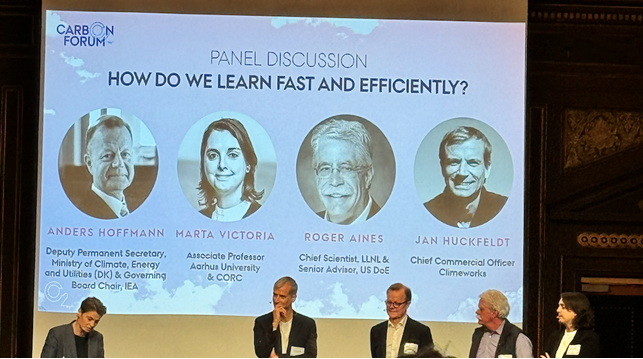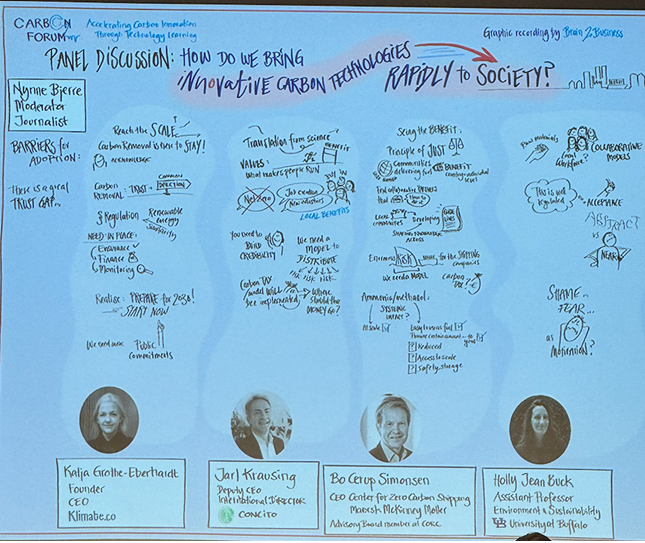This year, GSGroup had the opportunity to attend the Novo Nordisk Foundation CO2 Research Center’s second annual Carbon Forum, emphasizing the theme "Accelerating Carbon Innovation Through Technology Learning."
The forum focused on the transformative power of technology in addressing climate challenges, with an exploration of the parallels between solar photovoltaic (PV) technology and the development of new carbon tech and the merits of a granular approach in carbon removal strategies.
-This topic is difficult and intangible for most of us, but if you scratch the surface, you see that this is something that most industries can benefit from and are benefiting from, says Agnes Levander, Head of Marketing Scandinavia at GSGroup.
A significant highlight was the discussion on the untapped potential of ocean carbon capture, which garnered attention for its promising prospects in mitigating climate change.
The conversation then pivoted toward the pressing need to transition the shipping industry to greener practices and the necessity of developments such as green corridors, scalable fuel alternatives, and elevating energy efficiency.

Transport, Increased Costs, and Environment
When addressing the question, is it possible to decarbonize shipping? Bo Cerup-Simonsen, CEO at Maersk McKinney Møller Center for Zero Carbon Shipping, and Advisory Board member at Corc. was both positive and pragmatic.
- Yes, it's technically possible. If we look at technologies available today or that will be matured over the next five years, we can say, yes, we can decarbonize deep ocean shipping with new technologies, said Cerup-Simonsen.
Viewing this through regulatory lenses, we see a quite complex landscape because now you have to get authorities worldwide to allow storage of new fuel types and have new safety routines, etc. So there is a massive piece of work to be done on the regulatory side," Cerup-Simonsen continued.
- Finally, it must also make sense on the commercial and economic side. And here is the thing, these new solutions will be more expensive than the fossil-fueled solution. There is no doubt about that.
Many of the challenges are the same whether the transportation is by sea or on land.
- The transport cost will increase by 20 - 40 percent, maybe even more in some cases. And if you look at it in isolation and say that this is now in competition with the fossil solution, there will not be a willingness in most markets to pay what it costs now. That's just how it is," said Cerup-Simonsen, following up with a concrete example.
- For example, if you buy an electric vehicle today, and the cost for that vehicle is $100,000, you need around $1,000 extra to make it decarbonized as a product. But we can't mobilize that supply chain, so you can't check off a box and pay $1,000 extra and get a decarbonized product.
The forum concluded with a focus on the social acceptance of carbon technologies, underscoring its critical role in successfully implementing such innovations.

Moderator Nynne Bjerre Christensen, led the conversations, while Anna Munck Laybourn's graphic facilitation added a visual layer to the exchange of ideas. This made the forum both informative and visually impactful, says Levander at GSGroup.

-It is important for GSGroup to be part of these discussions simply to know what the headlines are locally, nationally, and globally. In this way, we can learn more about what expectations are set and how we can deliver the best offer to our customers both today and in the years to come," says Levander.
The Carbon Forum is a distinguished forum, recurring annually, aimed at key influencers, including policymakers, industry leaders, civil servants, researchers, media professionals, various organizations, and other influential decision-makers. It is an essential hub for in-depth discussions regarding the synergies among technical, economic, and socio-economic aspects of the ecological transition. The Forum highlights our challenges and outlines the necessity for developing and executing comprehensive strategies and solutions for a greener future.
